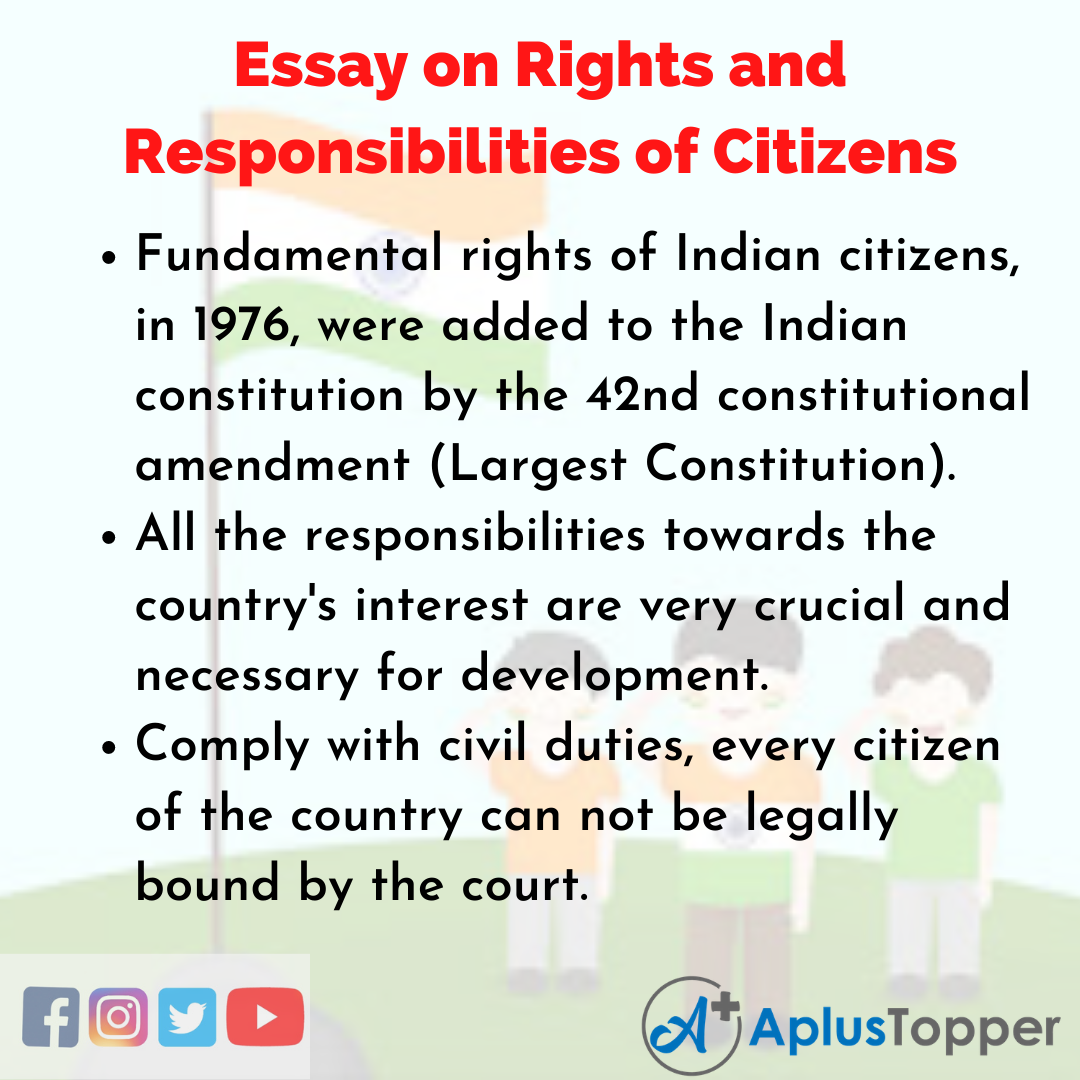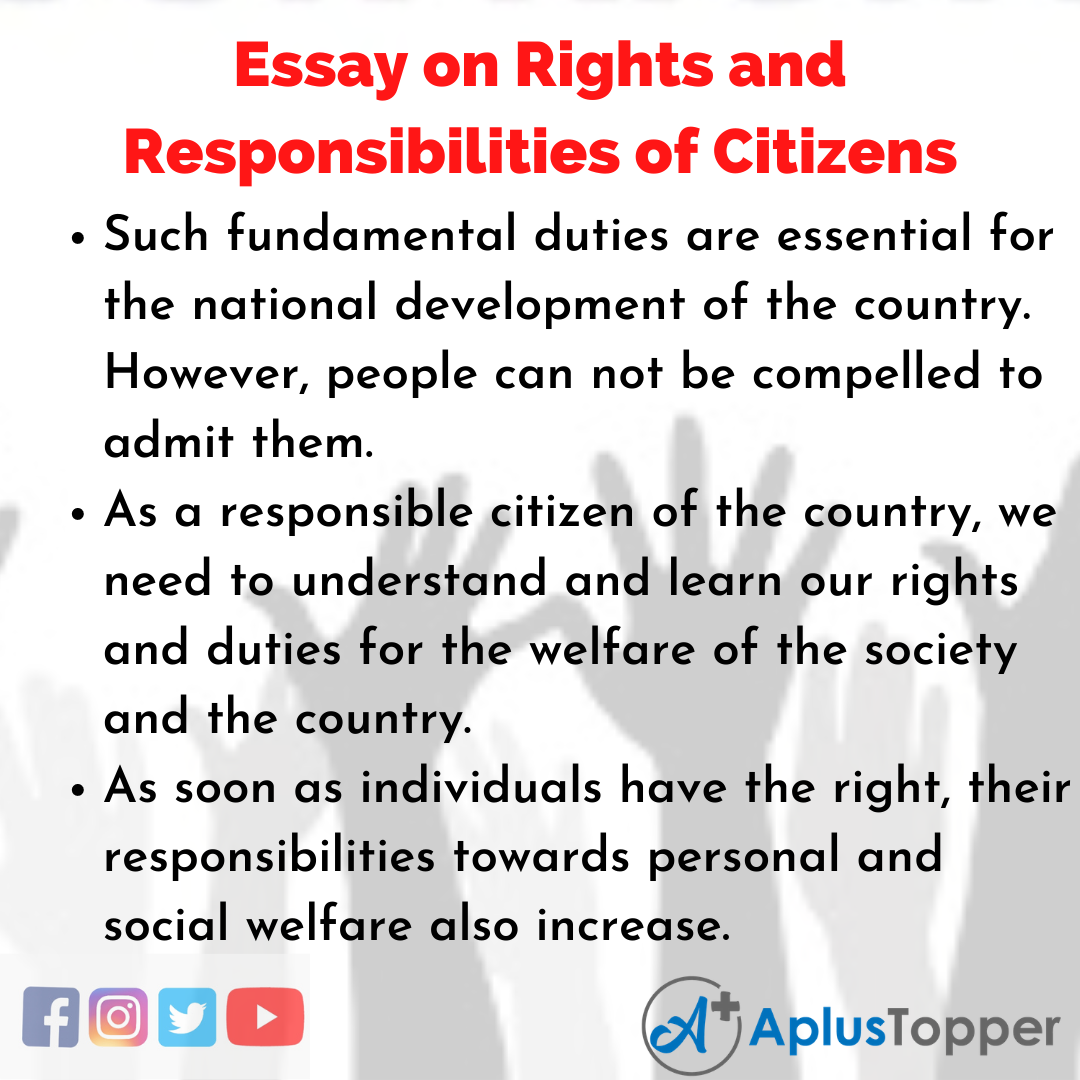Essay on Rights and Responsibilities of Citizens: India being a democratic country, where every citizen of the country lives with complete independence. However, they have various obligations towards their country. Rights and responsibilities are the two faces of the same coin, and both move alongside. If we have a right, then we also have some duties to engage with those rights. No matter wherever we are living, whether it is home, society, village, state or country, our rights and responsibilities go with our step by step.
Following the Preamble’s ideals, the Fundamental Rights of any citizen of India, as mentioned in Part III (Article 14- 32) of the constitution. These rights are given to citizens irrespective of race, place of birth, religion, caste, creed, or gender.
You can also find more Essay Writing articles on events, persons, sports, technology and many more.
Long and Short Essays on Rights and Responsibilities of Citizens for Students and Kids in English
We provide the students with essay samples on an extended essay of 500 words and a short essay of 150 words on this topic.
Long Essay on Rights and Responsibilities of Citizens 500 Words in English
Long Essay on Rights and Responsibilities of Citizens is usually given to classes 7, 8, 9, and 10.
Aristotle, the legendary Greek philosopher, said, “Man is by nature a social animal”, as we have many responsibilities and duties towards our society to bring development, prosperity and peace within the society and to the country. Fulfil its responsibilities, we as citizens have been given some fundamental rights through India’s Constitution. It becomes crucial to give rights to citizens to improve individual development and social life of each individual. The country’s democratic system is entirely dependent on the independence of the citizens of the country.
The rights given by the constitution to the citizens are called fundamental rights, which in regular times can not be withdrawn from us. Our constitution gives six fundamental rights to each citizen of this country:
- Right to freedom: This important fundamental right enables people to express their thoughts through speeches, by writing or by other means. According to this right, the person is free to give opinions against criticism or government policies. He/she is free to do any business in any corner of the country.
- Right to freedom of religion:Any Individual belonging from any religion can stay together without social chaos. There are many states in the country where people belonging to different religions live together. All individuals are free to follow, practice, publicize and emulate any religion of their choice. Nobody has the right to question anyone’s religious beliefs.
- Right to Equality:Any individual living in India are equal, and there is no discrimination and difference between rich, poor, high-low class people. A person belonging to any religion, caste, tribe, place can get a qualified higher rank in any office.
- Right to Education: Every child of the country has the right to receive an education. The child also has the right to receive education at any stage in any institution.
- Right against exploitation: Nobody has the right to force anyone against their wishes or any child under 14.
- The right to constitutional remedies: This is the most important right because it acts as the constitution’s soul. This fundamental right protects all the other rights of the constitution. If anyone feels like their rights have been hampered in any situation, they can go to court for justice.
As we all know, rights and responsibilities go hand in hand. The fundamental brights are meaningless without responsibilities. Thus both are inspirational. If we do not fulfil our responsibilities to run the country smoothly on the path of progress, we shall not enjoy the fundamental rights. Duty and responsibilities of every citizen are as follows:
- Everyone must respect our national flag and national anthem.
- Everyone must obey and follow the laws of the country.
- Everyone should enjoy their rights without interfering in the freedom of others.
- Everyone must always be ready to protect the country whenever necessary.
- Everyone must respect and protect national heritage and public properties.
- Everyone should pay their taxes properly on time.
Short Essay on Rights and Responsibilities of Citizens 150 Words in English
Short Essay on Rights and Responsibilities of Citizens is usually given to classes 1, 2, 3, 4, 5, and 6.
Citizens living in the country should know their rights and responsibilities towards their nation. Understanding all the rules and regulations brought about by the Constitution of the Country will help the nation’s citizens fulfil their responsibilities for the country’s development. Individuals must fully understand their rights and freedom in the country and their duties to serve the community and the country. India’s constitution came into effect on 26th January 1950, and it has offered democratic rights to the citizens of the country. According to the Indian constitution, the people of India hold many rights and responsibilities.
There are six fundamental rights in the Indian Constitution, and no individual can live democratically without these rights. This is the way by which democracy works in any country. Citizens of that country get rights, and such rights save the dictatorship of the government. Fundamental rights enable people in the evolution of people’s ethical, physical and personality. In the event of a violation of rights, any individual can take refuge in court for justice.
10 Lines on Rights and Responsibilities of Citizens in English
- Fundamental rights of Indian citizens, in 1976, were added to the Indian constitution by the 42nd constitutional amendment (Largest Constitution).
- All the responsibilities towards the country’s interest are very crucial and necessary for development.
- Comply with civil duties, every citizen of the country can not be legally bound by the court.
- Any individual who is not following the fundamental duties, then he/she can not be punished because there is no legislation to follow these duties.
- Fundamental Rights (Right to Equality, Right to Freedom, Right Against Exploitation, Right to Freedom, Right to Culture and Education and Right to Constitutional Remedies) are an essential part of the Indian Constitution.
- Some fundamental duties included in the Indian constitution mention that every citizen should respect the national flag, respect the national anthem, protect their country whenever needed, remain committed to national service, protect public properties, etc.
- Such fundamental duties are essential for the national development of the country. However, people can not be compelled to admit them.
- As a responsible citizen of the country, we need to understand and learn our rights and duties for the welfare of the society and the country.
- As soon as individuals have the right, their responsibilities towards personal and social welfare also increase.
- To bring some positive changes to society and the country, citizens of the country need to change their thinking in work.
FAQ’s on Rights and Responsibilities of Citizens Essay
Question 1.
What are human rights?
Answer:
Human rights are universal legal guarantees guarding individuals and groups against actions and omissions that hinder fundamental freedoms, entitlements and human dignity. Human rights law principally obliges Governments and other duty-bearers to do certain things and prevents them from doing others.
Question 2.
Is there any hierarchy among human rights?
Answer:
No, all human rights are equally important. The 1948 Universal Declaration of Human Rights made it clear that human rights are of all kinds (economic, political, civil, cultural and social), which are of equal validity and importance. This fact has been reaffirmed repeatedly by the international community, for example in the 1986 Declaration on the Right to Development, the 1993 Vienna Declaration and Programme of Action, three and the near-universally ratified Convention on the Rights of the Child.


